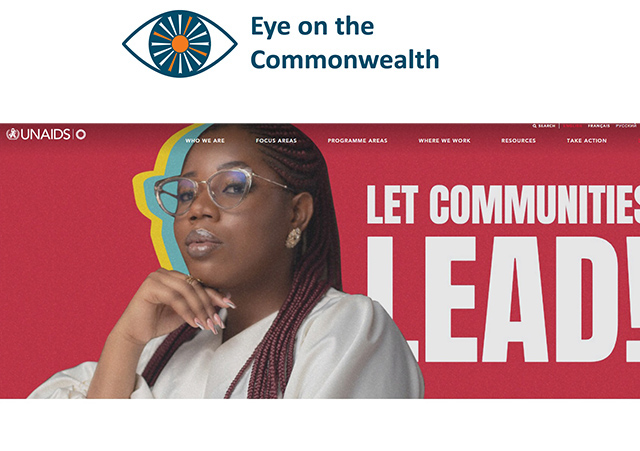 [picture: UNAids website]
[picture: UNAids website]
Ignorance and prejudice only help the disease and the 31 Commonwealth states that criminalise gay sex are holding back their own countries and the world.
Can we end the scourge of Aids by 2030? The United Nations agency that leads the fight against the killer disease thinks so, though it does have caveats. The very idea of eradicating this pandemic, which cut such a swathe through the world in the 1980s and 1990s, once seemed a pipe dream. But with nearly 30 million people, of 85 million infected with HIV, now able to access antiretroviral therapy, the disease is no longer the inevitable death sentence it was once. ‘Aids can be ended as a public health threat by 2030,’ UNAids believes, ‘but only if communities on the frontlines get the full support they need from governments and donors.’
It is still quite some threat: a life is lost to Aids every minute. The death toll from Covid-19, a pandemic some compared to Spanish flu, has reached 7 million, but more than 40 million people – and perhaps 50 million – have died from Aids-related illnesses. And though new HIV infections have fallen by 59% since their peak in 1995, up to 1.7 million people became newly infected last year.
With half of all new infections in sub-Saharan Africa, the struggle against Aids is also a Commonwealth issue. For Winnie Byanyima, director of UNAids, the way to end this waste of life is clear: by empowering frontline communities. ‘But,’ she says, ‘they need the barriers obstructing their work to be pulled down, and they need to be properly resourced.’
The new law fuelling anti-gay hatred in Uganda is Museveni’s ‘dead cat strategy’
Realising the Right to Health for Young People in South Africa—Some Reflections
Grassroots campaigning
In Let Communities Lead, a report issued on World Aids Day this week, UNAids gave examples of how community engagement can foster success in the campaign against the disease. One of the most spectacular examples of successful grassroots-led campaigning has been in slashing the annual cost of treating patients with HIV: from $25,000 in 1995 to under $70 now in many countries. The International Treatment Preparedness Coalition, a global network of civil society organisations from more than 20 countries, including patients, lawyers, health experts and activists, successfully challenged patent law, pushed for policy reforms, monitored trade talks and challenged attempts to increase intellectual property protections for ‘big pharma’ to successfully bring down the cost by 99%.
Another was in South Africa, where 330,000 people died prematurely from HIV/Aids between 2000 and 2005 due to the government’s denial of life-saving treatment, and at least 35,000 babies were born with preventable HIV infections. It took the relentless pressure of the Treatment Action Campaign to force President Thabo Mbeki to reverse his policy and make antiretrovirals available to treat HIV and prevent mothers passing on the virus to their babies.
The World Bank found that programmes delivered by community-based organisations led to a 64% increase in access to HIV treatment in rural Nigeria and made using prevention services twice as likely. In Kenya, the same study found that where there was high engagement by community-based organisations there was also a four-fold increase in consistent condom use with partners. Peer support for women living with HIV boosted use of antiretrovirals to 99.7% in Uganda and interventions involving communities led to a marked increase in HIV testing among young people in Mangochi, Malawi, and in Zambia’s capital, Lusaka.
Among society’s most marginalised members, communities’ critical role is even more stark. Sex workers in Iringa, Tanzania, for example, targeted by peer-based interventions had less than half the HIV incidence of those who did not take part. And community participation was linked to one-third lower odds of having a sexually transmitted infection among sex workers in British Columbia, Canada.
‘Eye on the Commonwealth’ columns look at current issues facing the Commonwealth
Find out more about the Commonwealth Round Table and the Round Table Journal
Criminalising hinders progress
Working with these vulnerable populations, such as sex workers, drug users, or transgender people, is fundamental to tackling the disease. According to UNAids’ research, countries that criminalise these groups saw less progress towards HIV testing and treatment targets ‘with significantly lower percentages of people living with HIV knowing their HIV status and achieving viral suppression’. In countries where same-sex relations are criminalised, HIV prevalence is five times higher among men who have sex with men than where it is not. And where there have been recent prosecutions, this increases to 12 times higher.
Yet 67 countries still criminalise same-sex relations, 125 countries make drug use or possession a criminal offence, and 167 countries criminalise sex work. Of those 67 states with anti-LGBTQ+ laws, 31 are Commonwealth members, with British colonial-era statutes still enshrined in their constitution. As many countries, such as Botswana, decriminalised gay sex, Nigeria’s president, Goodluck Jonathan, was imposing draconian homophobic laws. Some went further, with the Ugandan government glorying in its ‘hate legislation’ by passing a law in March mandating the death penalty for ‘aggravated homosexuality’.
The struggle against HIV/Aids has come a long way since the 1980s, when activist groups such as ACT UP blockaded US government agencies to get access to experimental drugs. Many key demands from then have been met: funding for research and treatment increased exponentially, the public became better educated about the disease, and Aids awareness became part of sex education in schools. But far too little has changed in other ways and those 31 Commonwealth states are a reminder that the fight against Aids will not end until those countries accept that their most marginalised people are also citizens, and their human rights must also be respected. As Byanyima said: ‘The global anti-rights wave doesn’t just threaten democracy and personal freedom, it threatens the health of everyone.’
Oren Gruenbaum is a member of the Round Table editorial board.



